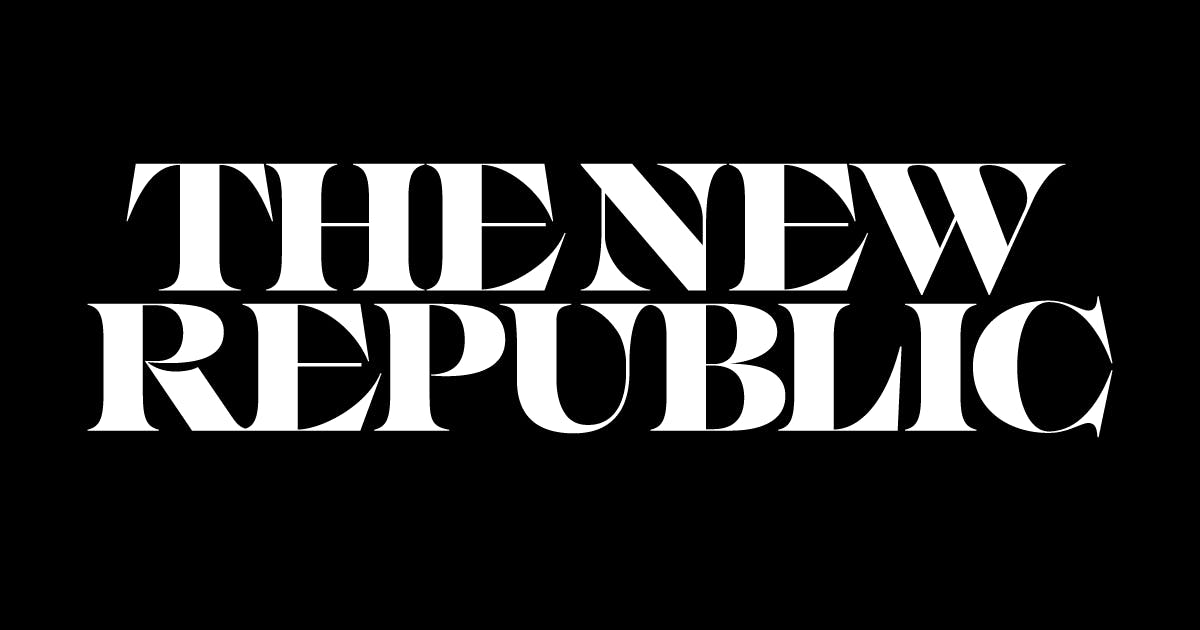Ukraine, EU on edge as Russia-friendly French far-right rises to power
As the National Rally party, known for its ties to Russia, secures a significant portion of the vote in France's legislative elections, Ukraine and the European Union brace for potential shifts in France's foreign policy that could undermine support for Kyiv and weaken Paris' influence in Europe.
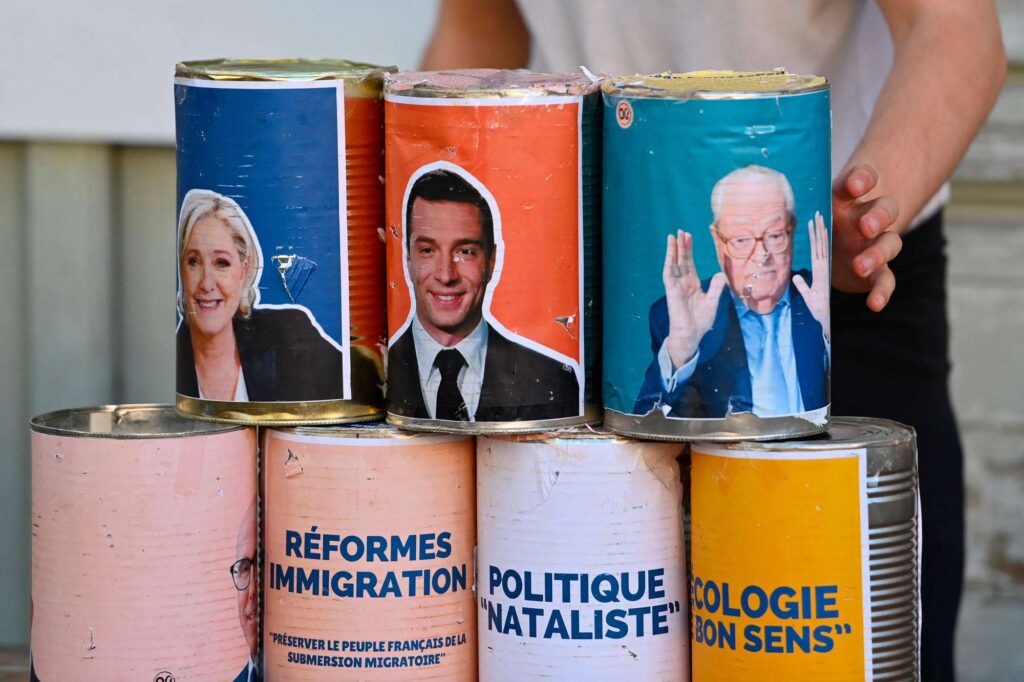

An hour after the announcement of the results of the European elections on Sunday, 9 June 2024, French President Emmanuel Macron declared a return to the polls, stating: “I have decided to give you the choice of our parliamentary future through voting. Therefore, I am dissolving the National Assembly this evening,” in front of an audience of 15.3 million viewers.
This decision paved the way for the far-right, sovereigntist party with Russian sympathies, the National Rally (RN), to be on the brink of power.
After a lightning campaign that saw the National Rally (RN) secure 29.3% of the vote in the first round, the far-right party is now on the brink of power as the country awaits the second round of elections. The National Rally (RN) has already become the leading political force in France.
While the party has timidly vowed to continue aid to Ukraine, its history of cozying up to Putin, vows to dial back France’s military engagement in the Russo-Ukrainian war, and prominent place in disinformation campaigns have Kyiv and the EU worried.
Although the outcome of France’s future foreign policy still hinges on the future relations between the president and prime minister, it is more than certain that France’s Macron-era European lead on helping Ukraine is a thing of the past.
Historical ties between Russia and the National Rally (RN)
According to Sylvain Kahn, a professor at the Center for History at Sciences Po and author of “L’Europe face à l’Ukraine,” the ties between the French far-right represented by the National Rally (RN) and Russia have deep roots.
“First, the way in which Putin’s regime administers Russian society fascinates sovereigntists. He is seen as a model of a head of state. Second, the French far-right also have an affinity for an alliance with Russia as they aim to prove France is not a vassal to the United States.” he said.
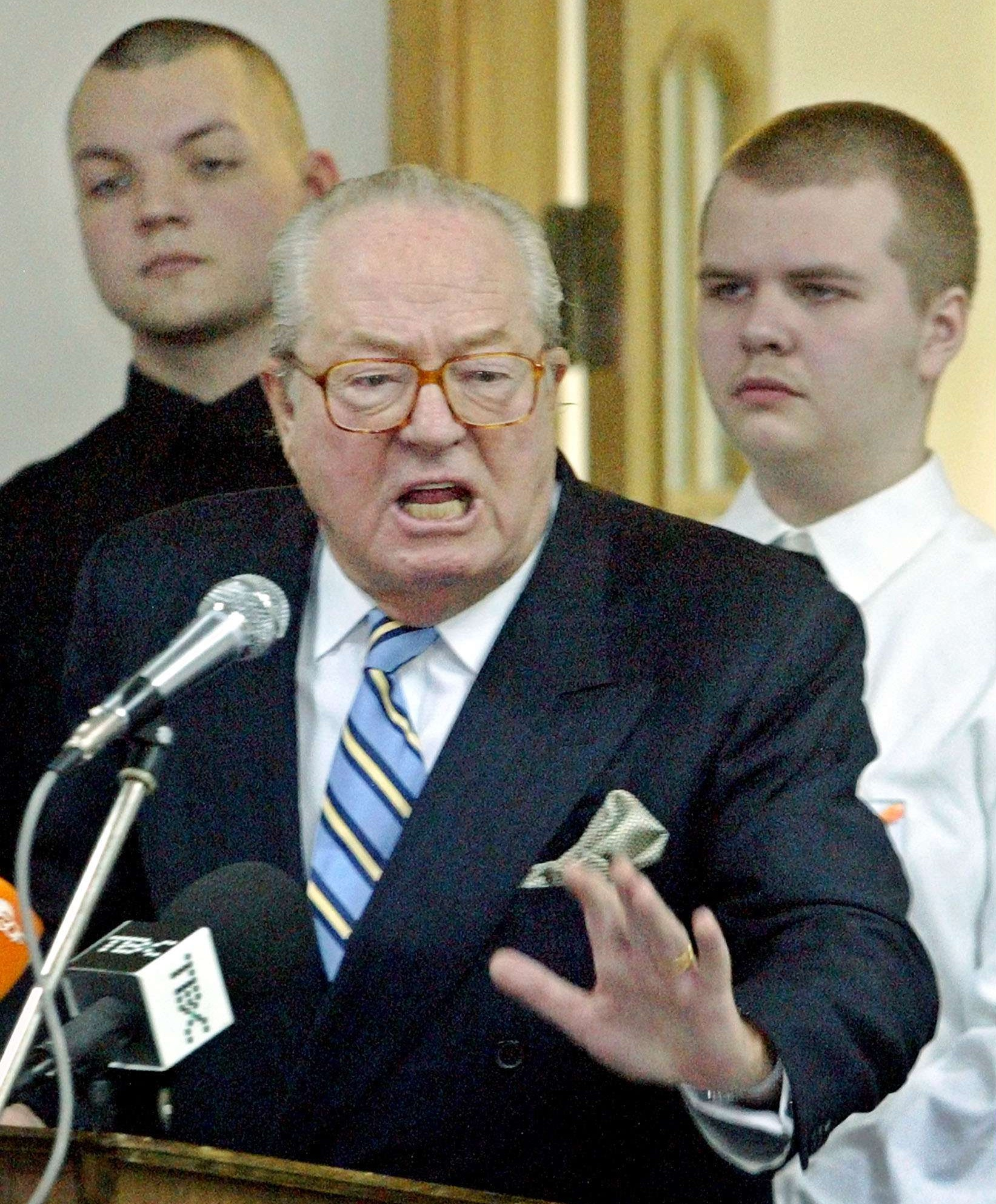
These ties have strengthened over the years, and up until the invasion of Ukraine in 2022, the National Rally (RN) – financed by Russian loans obtained in 2014 – openly defended Vladimir Putin’s Russia. This positioning has influenced the current legislative elections.
According to a study by the French investigative media outlet Mediapart, at least fifteen candidates nominated by the National Rally (RN) have carried out electoral observation missions for Russia or high-level visits to Moscow, or have been the pillars of associations promoting Vladimir Putin’s regime before the full-scale invasion of 2022.
Invested in Hénin-Beaumont (in the north of France), Marine Le Pen is the one who established the progressive line as the official discourse of the party between 2011 and 2022.
During these years, the RN deputy, who publicly expressed her “admiration for Vladimir Putin”, was received at the highest level in Moscow: by the Russian president himself in 2017, and also, on three occasions, by the president of the Duma (at the time Sergei Naryshkin).
In 2014, Marine Le Pen and her father secured two Russian loans totaling EUR 11 million to finance their party’s campaign. Two years later, she signed a Russian loan project – which ultimately did not materialize – that provided for the payment of EUR 3 million to “finance the presidential election campaign.”
During this period, she aligned her statements and votes with the interests of Vladimir Putin’s regime, even contesting any illegal annexation of Crimea.
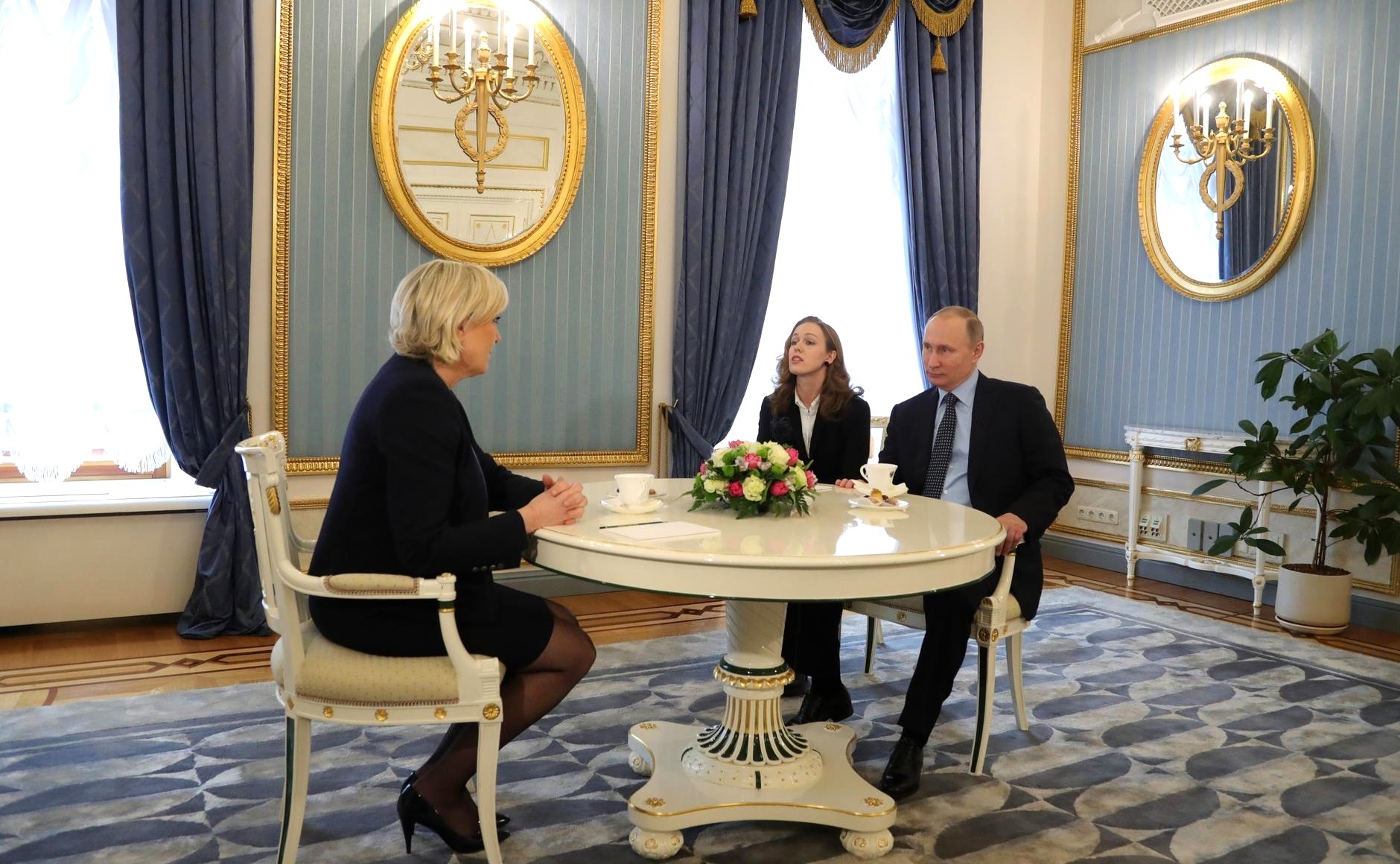
Although she condemned the Russian invasion in February 2022, she has been lenient towards Russia, blaming the escalation on Emmanuel Macron, whom she describes as a “warmonger.” With the RN, she has excluded offensive weapons from aid to Ukraine, opposed energy sanctions against Russia, and proposed recognizing Crimea as Russian as one of the ways to resolve the conflict.
Marine Le Pen’s sister, Marie-Caroline Le Pen – who scored 39.3% in the Sarthe department – and her husband MEP Philippe Olivier, special advisor to the RN, were received in Moscow in 2018 by oligarch Konstantin Malofeev. He is suspected of being behind the party’s first Russian loan, accused of playing a key role in the annexation of Crimea and financing Russian proxy forces in Ukraine’s easternmost Donbas region.
At the time, the oligarch was leading a confidential project called “AltIntern“, which aimed to build an alliance of European far-right parties, and Philippe Olivier was mentioned twice in the documents. Two years later, he traveled to Crimea as an observer of the constitutional referendum. Not an isolated case.
Ten National Rally (RN) elected officials “observers” of Russian elections
These observation missions in Russia, Crimea, and the Donbas, condemned by the international community, are most often “at the invitation of the Russians and paid for by the Russians,” as MEP Thierry Mariani had indicated.
In its 2022 report, the French parliamentary inquiry committee on foreign interference estimated that these trips were “one of the privileged ways for the National Rally to display its support for Vladimir Putin’s regime,” and that the Russian authorities “may have wanted to use the legitimacy of European MPs to validate the discourse and actions of the Kremlin.”
During his testimony, the former head of the French domestic intelligence service (DGSI) openly questioned the motivations of these elected officials: “Agreeing to serve as a guarantee for a supposedly democratic and transparent process amounts to crossing a line in terms of allegiance to the country concerned,” said Nicolas Lerner, adding, without naming any party, that some parliamentarians had “clearly maintained clandestine relationships with intelligence services.”
Many RN members have carried out such election observation missions.
In July 2020, ten RN MEPs were among the sixty or so international experts brought to Russia at the expense of a mysterious benefactor to validate the referendum organized by Moscow.
They included the party’s vice-president, Hélène Laporte, who is running for office in the Lot-et-Garonne department and scored 49.31% in her constituency last Sunday, MP Julie Lechanteux (who was elected in the first round with 51.5% in the Var department), and RN spokesperson Jean-Lin Lacapelle (qualified with 43.4%), who is running in the Loiret department.
The RN delegation was publicly very complimentary, praising “a lesson in democracy” (Hélène Laporte), a referendum adopted with 77% of the votes, “which went well” (Julie Lechanteux), or “sanitary and electoral rules respected,” contrary to “fake news” (Jean-Lin Lacapelle). The event is far from insignificant: this controversial constitutional referendum allowed, among other things, Vladimir Putin to remain in power for two additional terms.
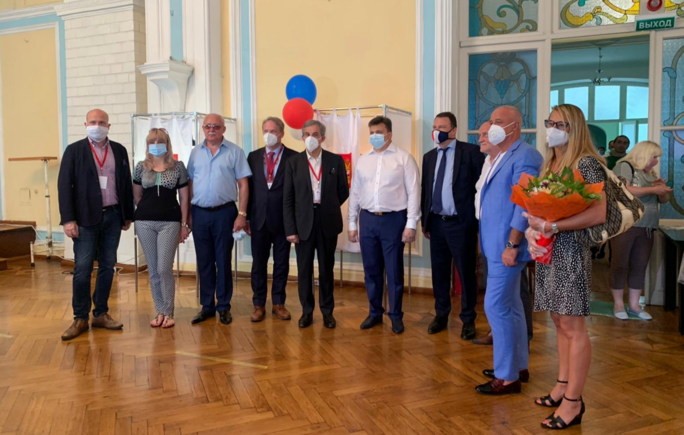
Another RN spokesperson was an observer of elections held in the Donbas in 2018, supported by Russia but deemed illegal by Europe, Kyiv, and the United States.
Hybrid War: European and legislative campaigns
During the European elections, pro-Russian networks conducted an influence campaign in favor of the National Rally (RN) list and attempted to discredit French media and fact-checkers. Although the RN officially distanced itself from the Russian executive, this influence campaign shows that Moscow still considers the party an ally in Europe.
The disinformation campaign during these elections included a few thousand publications on social networks, notably TikTok, X, Facebook, and Telegram.
Although the campaign did not have a great success in terms of audience, it was significant enough for the French state services responsible for monitoring against foreign digital interference to warn the RN’s campaign management.
The RN denied any involvement in this influence campaign but condemned this destabilization operation. This pro-RN campaign adds to other attempts at influence and disinformation targeting the French public, notably the “Matryoshka” operation which aims to discredit French media, personalities, and fact-checkers by overwhelming them with requests to verify false content.
France is a privileged target of this campaign, with at least 90 maneuvers detected and at least 500 social media accounts targeted since the beginning of the campaign in September 2023. French media such as BFMTV, Le Parisien, Libération, Le Monde as well as the DGSI, have been victims of identity theft and have seen false content disseminated under their name.
The content disseminated propagates and amplifies anti-Ukrainian narratives, criticizes France’s policy of supporting Ukraine, and seeks to spread the idea that the 2024 Paris Olympics will be a failure, all subjects regularly pushed by Russia.
Moreover, investigations by VIGINUM, the French government’s technical and operational service responsible for vigilance and protection against foreign digital interference, have established that the majority of the content disseminated had been previously published by Russian Telegram channels already identified in information maneuvers.
What does this mean for Ukraine?
According to François Heisbourg, special advisor at the IISS (International Institute for Strategic Studies) and special advisor to the president of the Foundation for Strategic Research (FRS), “France will not be a driving force in defining and framing aid to Ukraine.” He adds that “we are witnessing a downgrading of France within the EU.”
Yannick Pincé, a doctor in contemporary history and researcher at the Center for Interdisciplinary Studies on Strategic Issues (CIENS) of ENS/PSL, explains that the distribution of defense-related competencies between the Prime Minister and the President in France is ambiguous.
The “reserved domain” does not exist in the French Constitution, it was invented by Jacques Chaban-Delmas in 1959 to justify General de Gaulle’s intervention in foreign policy and defense.
According to Yannick Pincé, “the Constitution divides powers in matters of defense between the President and the Prime Minister. The President is the guarantor of national sovereignty and the head of the armed forces (articles 5 and 15), while the government determines the policy of the nation, including defense, and the Prime Minister has control over the armed forces (articles 20 and 21).” However, he adds that “the Constitution, in fact, is very ambiguous on these issues.”
If Jordan Bardella becomes Prime Minister, the question of whether he will challenge military aid to Ukraine is uncertain.
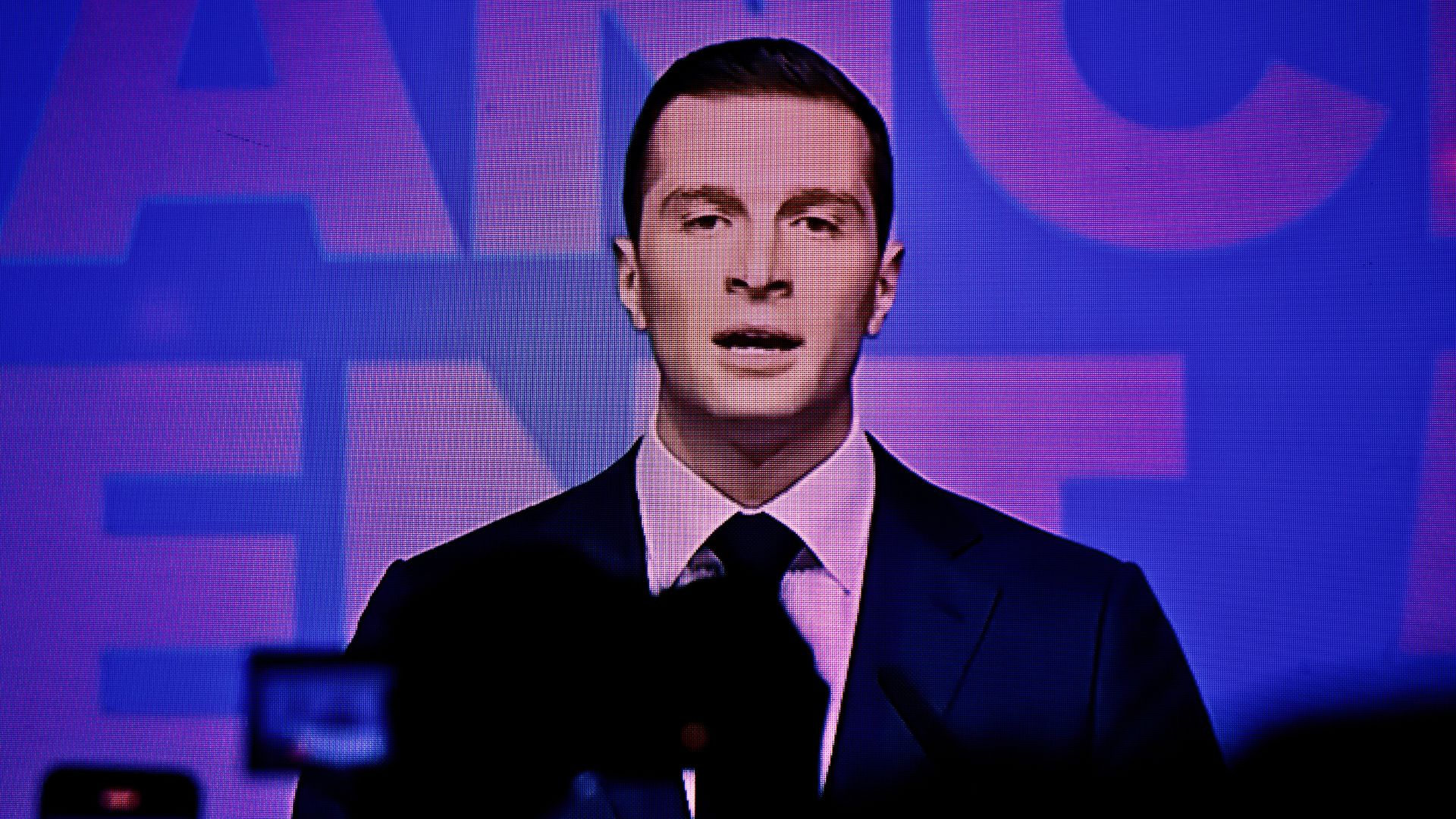
Although the RN assures that it will not, there are nuances in their position.
Ukrainians are concerned about the political situation in France, as France has supported Ukraine militarily and financially since February 2022. However, in the event of cohabitation, tensions between the President and his Prime Minister could block a number of defense-related files, including military aid to Ukraine.
According to Yannick Pincé, “the government, which has a majority in Parliament and votes on the budget, can theoretically go against the President’s decisions in matters of defense. However, this can lead to a conflict with the President, who can take public opinion as a witness or use his power of blockage in the defense council.” This distribution of powers has been a source of conflict between the President and the Prime Minister, particularly during periods of cohabitation.
Yannick Pincé also points out that “if you have a NATO Parliamentary Assembly, then you will have RN members who will have access to NATO decision-making spaces. I don’t have all the details of what is discussed, but just taking the political pulse, in itself, is providing information to the other side.”
According to Sylvain Kahn, “all other EU member states will therefore be wary of their exchanges with the French ensemble, on the grounds that all sensitive information could leak to Russia.”
This mistrust could have consequences for aid to Ukraine, both at the French and European levels.
As president, Emmanuel Macron has turned into one of the European Union’s most outspoken advocates for bringing Ukraine into nato. The RN has stated that it will not cross the “red line” that could make France a co-belligerent. It opposes offensive systems that would increase the risk of escalation with Russia, such as long-range missiles, as well as the deployment of ground troops.
However, the positions displayed by the RN are worrying for Kyiv, as the party has long had strong relations with Moscow and has only “rallied half-heartedly to support Kyiv.” Sylvain Kahn said.
The RN’s support for Ukraine is rarely expressed in the European Parliament. According to a HuffPost article, out of 14 votes on Ukraine support between March 2022 and February 2024, MEP Jordan Bardella and the president of the party National Rally (RN) – the potential future Prime Minister – voted in favor of support measures only once.
Related:
- Le Pen vows to stop Ukraine using French weapons inside Russia if far-right wins French election
- French far-right leader vows to not let “Russian imperialism absorb” Ukraine, but opposes sending long-range missiles if elected
- Pro-Ukrainian parties maintain majority in EU elections, far-right parties still make gains
- French ex-National Rally leader Le Pen, once Putin’s ‘friend,’ condemns Russian invasion


